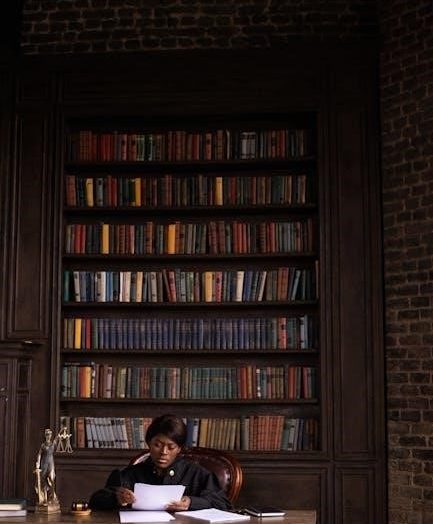Michael Sandel’s “Justice” explores fundamental moral and ethical dilemmas, offering insights into theories of justice through real-world examples and philosophical debates, making it a vital resource for understanding ethics.
Overview of Michael Sandel’s Work on Justice
Michael Sandel, a renowned Harvard philosopher, explores justice through engaging, accessible discussions. His work challenges traditional theories, emphasizing moral reasoning and real-world applications. Sandel’s approach, influenced by Aristotle, highlights virtues and moral habits, offering a fresh perspective on justice. His teaching style, which encourages dialogue and debate, has made his Harvard course immensely popular. By examining justice in everyday life, Sandel bridges philosophy with practical ethics, making complex ideas understandable for a broad audience.
The Relevance of the PDF Resource
The PDF resource “Justice with Michael Sandel” is a concise and accessible guide to understanding key theories of justice. It encapsulates Sandel’s Harvard lectures, offering insights into utilitarianism, Kantian ethics, and Rawls’ justice as fairness. The document also explores Sandel’s critique of these theories, advocating for an Aristotelian approach. This resource is invaluable for both academic and personal study, providing structured content that facilitates a deeper understanding of moral philosophy. Its clear presentation makes it an essential tool for anyone interested in exploring justice and ethics in a modern context.
Key Themes in Sandel’s Approach to Justice
Michael Sandel’s approach to justice emphasizes moral reasoning, ethical dilemmas, and the critique of traditional theories. He explores themes such as the morality of torture, lying, and stealing, challenging conventional philosophical frameworks. Sandel advocates for an Aristotelian perspective, highlighting the role of virtues and moral habits in determining justice. His work also examines the tension between individual rights and societal welfare, offering a nuanced critique of modern liberalism. By engaging real-world examples, Sandel encourages readers to think critically about justice in everyday life, making his insights both accessible and thought-provoking for a broad audience.

Major Theories of Justice Explored in the Book
Sandel examines utilitarianism, Kantian ethics, and Rawls’ theory of justice as fairness, critiquing their moral and philosophical foundations while exploring their relevance to modern society.
Utilitarianism and Its Critics
Utilitarianism, championed by Jeremy Bentham and John Stuart Mill, posits that actions are morally right if they maximize overall happiness and minimize suffering. Sandel critiques this theory, arguing that it oversimplifies complex moral dilemmas. For instance, in cases like the trolley problem, Utilitarian logic can lead to morally questionable conclusions. Critics, including Sandel, contend that this approach neglects individual rights and moral absolutes, potentially justifying morally wrong actions for the greater good. Sandel emphasizes the need to consider moral reasoning beyond mere outcomes, highlighting the limitations of Utilitarianism in addressing justice and ethics.
Kantian Ethics and MoralAbsolutism
Kantian Ethics and Moral Absolutism
Kantian ethics, rooted in Immanuel Kant’s philosophy, emphasizes moral absolutes and the “categorical imperative,” where actions are judged by their adherence to universal moral laws. Sandel examines Kant’s rigid moral framework, which prioritizes duty over consequences. He critiques Kant’s absolutism, arguing that it often leads to inflexible moral judgments in complex real-world scenarios. For instance, Kant’s refusal to justify lying, even to prevent harm, highlights the tension between moral absolutism and practical ethics. Sandel challenges this approach, advocating for a more nuanced understanding of morality that balances principle with context.
John Rawls’ Theory of Justice as Fairness
John Rawls’ theory of justice as fairness, as discussed by Sandel, posits that a just society should prioritize equal basic liberties and ensure inequalities benefit the least advantaged. Rawls’ “original position” concept imagines individuals behind a “veil of ignorance,” choosing principles without knowing their social status. Sandel highlights Rawls’ emphasis on fairness over utility, critiquing its reliance on rational choice theory. While Rawls’ framework is influential, Sandel argues it may overlook the role of moral and civic virtues in shaping justice, offering a complementary Aristotelian perspective that prioritizes character and community.

Sandel’s Critique of Traditional Theories
Sandel challenges Kantian and Utilitarian approaches, arguing they neglect the role of virtues and community in shaping justice, advocating instead for an Aristotelian emphasis on moral character.
Challenges to Kantian and Utilitarian Approaches
Sandel critiques Kantian ethics for prioritizing rigid moral rules over human consequences, arguing it neglects the complexity of real-world dilemmas. Similarly, he challenges Utilitarianism for potentially justifying harmful actions if they maximize overall happiness. Sandel questions the moral absolutism of Kant and the consequentialism of Utilitarianism, emphasizing their limitations in addressing issues like torture or stealing. He advocates for a more nuanced approach, blending Aristotelian virtues with ethical reasoning to better navigate moral ambiguities. Sandel’s critique highlights the need for a justice theory that balances individual rights with communal well-being.
The Limits of Rationalist Approaches to Justice
Rationalist theories often fail to account for the richness of human experience and culture. Sandel argues that purely rational approaches, like those of Kant and Rawls, may overlook the importance of virtues and moral habits in shaping just societies. He suggests that justice cannot be derived solely from reason but requires an understanding of the common good and shared ethical practices. Sandel’s critique emphasizes the need for a more holistic approach that integrates reason with tradition and communal values, offering a balanced perspective on justice beyond mere rational constructs.

Moral Reasoning and Ethical Dilemmas
Moral reasoning is central to Sandel’s exploration of justice, encouraging critical engagement with ethical dilemmas. Through real-life examples, he examines when lying or stealing might be justified, challenging readers to think deeply about morality in complex situations.
Case Studies and Real-World Applications
Sandel’s work is enriched with real-world examples, such as debates on redistributive taxation and property rights, illustrating how theoretical concepts apply to everyday life. He uses scenarios involving figures like Bill Gates and Michael Jordan to explore ethical dilemmas, making complex philosophical ideas accessible. By examining cases like murder under extreme circumstances, Sandel bridges the gap between abstract theory and practical morality, encouraging readers to engage with justice in tangible contexts.
When Is It Okay to Lie or Steal?
Sandel examines morally complex questions such as lying and stealing, challenging readers to think critically about when such actions might be justified. Through ethical dilemmas, he explores the tension between moral absolutism and situational ethics, questioning whether universal moral rules apply in all circumstances. Sandel’s analysis encourages readers to evaluate the morality of actions based on their consequences and the principles they uphold, providing a nuanced understanding of ethical decision-making.
The Morality of Torture and Extreme Circumstances
Sandel delves into the ethical complexities surrounding torture and extreme situations, questioning whether such acts can ever be morally justified. He examines the moral absolutist stance, which rejects torture under any circumstances, and contrasts it with utilitarian perspectives that weigh outcomes. Through real-world examples, Sandel challenges readers to consider the ethical implications of prioritizing security over human rights and the potential long-term consequences of compromising moral principles. His analysis provokes critical thinking about the boundaries of justice in dire scenarios.

Sandel’s Aristotelian Approach to Justice
Sandel’s work emphasizes the role of virtues and moral habits, drawing on Aristotle’s philosophy to critique modern liberalism and advocate for a community-focused ethical practice.
The Role of Virtues and Moral Habits
Sandel emphasizes the importance of virtues and moral habits in shaping just societies. Drawing on Aristotle, he argues that justice is not merely about rules or outcomes but about cultivating good character. Virtues like honesty, compassion, and fairness are essential for moral reasoning. Sandel critiques modern liberalism for neglecting the role of character formation, advocating instead for a community-focused approach that nurtures ethical habits. This perspective challenges individuals to reflect on their moral practices and strive for excellence in their actions, fostering a deeper sense of justice in everyday life.
Critique of Modern Liberalism
Sandel critiques modern liberalism for prioritizing individual rights over communal values, arguing that this focus neglects the importance of shared moral and civic education. He contends that liberalism’s emphasis on procedural justice often overlooks substantive questions about the good life. Sandel advocates for a more Aristotelian approach, where justice is tied to fostering virtues and moral habits within a community. This critique challenges the notion that justice can be achieved solely through neutral procedures, emphasizing instead the need for ongoing moral dialogue and the cultivation of ethical character in society.

Justice and Morality in Everyday Life
This section explores how justice and morality influence daily decisions, examining real-world dilemmas like redistributive taxation and property rights, and the balance between individual rights and the common good.
Redistributive Taxation and Forced Labor
Michael Sandel critiques redistributive taxation, arguing it can be seen as a form of forced labor, where individuals’ property is taken without consent. He uses examples like Bill Gates and Michael Jordan to illustrate how taxing high incomes redistributes wealth, questioning the moral justification. Sandel challenges the notion that such systems are inherently just, arguing they often ignore the moral complexities of individual rights and property. This critique aligns with his broader examination of justice, emphasizing the need for a more nuanced understanding of morality in economic policies and societal structures.
The Libertarian Notion of Property Rights
Michael Sandel examines the libertarian view that property rights are absolute, arguing that redistributive taxation infringes upon individual liberty. Libertarians contend that taking property through taxes, even for public good, constitutes forced labor; Sandel uses examples like Bill Gates and Michael Jordan to highlight this perspective, questioning the moral justification for redistributing wealth. He critiques the notion that property rights are inviolable, challenging libertarians to consider the ethical implications of their stance. This debate reflects Sandel’s broader exploration of justice, emphasizing the tension between individual rights and societal obligations in economic policies.

The PDF as a Learning Resource
The PDF provides a structured exploration of justice, offering clear explanations and real-world examples. It serves as an accessible tool for academic and personal exploration of moral philosophy.
Structure and Content of the PDF
The PDF is organized into clear chapters, each addressing key themes in justice, from utilitarianism to Aristotelian ethics. It includes case studies, real-world examples, and thought exercises to engage readers. Sandel’s arguments are supported by references to philosophers like Kant, Mill, and Rawls, providing a comprehensive overview of justice theories. The document also explores moral dilemmas, such as torture and redistribution, encouraging readers to question their assumptions. Its accessible structure makes it a valuable resource for both academic and personal study, offering insights into Sandel’s renowned Harvard course and his unique approach to ethical reasoning.
How to Use the PDF for Academic or Personal Study
The PDF serves as an excellent resource for both academic and personal exploration of justice. Its structured chapters allow for focused study, with each section addressing key theories and moral dilemmas. For academic use, it can supplement course materials or serve as a primary text for discussions. Personally, readers can engage with case studies and ethical questions to deepen their understanding of justice. The document’s clarity and real-world examples make it accessible for self-study, encouraging critical thinking and reflection on moral principles in everyday life.

Michael Sandel’s Teaching Style
Michael Sandel’s teaching style is renowned for its interactivity, using real-world examples and case studies to engage students in critical moral reasoning and ethical discussions.
The Harvard Course “Justice” and Its Popularity
Michael Sandel’s “Justice” course at Harvard is one of the university’s most popular offerings, attracting thousands of students annually. The course is known for its engaging and interactive style, which encourages students to think critically about moral and ethical dilemmas. Sandel’s ability to make complex philosophical concepts accessible has made the course a favorite among undergraduates and graduate students alike.
The course’s popularity extends beyond Harvard, as it has been widely discussed and admired globally. Sandel’s lectures often explore real-world scenarios, such as torture, stealing, and lying, prompting students to question their assumptions about justice and morality. The course is also the basis for his acclaimed book, further cementing its influence in academic and public discourse.
Engaging Students in Moral Reasoning
Michael Sandel’s Harvard course is renowned for its ability to engage students in moral reasoning. By presenting real-world dilemmas, such as torture, stealing, and lying, Sandel encourages students to question their assumptions about justice and morality. His teaching style fosters an environment of active participation, where students are not passive listeners but active thinkers.
Sandel’s use of thought experiments and debates makes complex philosophical concepts relatable and accessible. This approach not only deepens students’ understanding of justice but also equips them with critical thinking skills to navigate ethical challenges in their own lives.

Impact and Reception of Sandel’s Work
Michael Sandel’s work has garnered widespread acclaim, influencing global perceptions of social justice and fostering ethical dialogue across diverse audiences and cultures.
Academic Reviews and Public Reception
Michael Sandel’s work has received widespread academic acclaim for its accessible exploration of complex ethical theories. His ability to engage both scholars and the general public has made his ideas highly influential. The PDF resource, based on his Harvard lectures and bestselling book, has been praised for its clarity and depth. Sandel’s approach to justice has sparked global discussions, bridging the gap between philosophy and everyday life. His work is celebrated for its thought-provoking nature, making it a valuable resource for students and enthusiasts of moral philosophy alike.
Global Perceptions of Social Justice
Michael Sandel’s work has resonated globally, influencing diverse perspectives on social justice. His exploration of moral reasoning and ethical dilemmas has sparked international discussions. Sandel’s lectures and writings, including the “Justice” PDF, have been translated and widely shared, addressing universal questions about fairness, rights, and morality. His approach bridges cultural divides, encouraging individuals worldwide to reflect on their values and societal norms. This global engagement highlights the enduring relevance of Sandel’s ideas in understanding and addressing social justice challenges across different cultures and contexts.

Comparisons with Other Philosophers
Michael Sandel’s ideas on justice are often contrasted with those of Kant, Mill, and Rawls. His critiques of utilitarianism and Kantian ethics highlight his unique Aristotelian perspective.
Rawls vs. Sandel on Justice
John Rawls’ theory of justice as fairness emphasizes redistributive taxation and equal opportunities, while Sandel critiques this rationalist approach, advocating for an Aristotelian focus on virtues and moral habits. Rawls’ veil of ignorance contrasts with Sandel’s emphasis on community values and moral dialogue. Sandel argues that justice is deeply rooted in cultural and ethical practices, challenging Rawls’ universal principles. This debate highlights fundamental differences in their approaches to fairness and morality in society.
Kant vs. Sandel on Moral Absolutism
Immanuel Kant’s moral absolutism posits that certain actions are inherently right or wrong, regardless of context. Sandel critiques this rigidity, arguing that moral judgments must consider specific circumstances and cultural values. Kant’s categorical imperative contrasts with Sandel’s emphasis on ethical reasoning rooted in community and tradition. Sandel contends that Kant’s framework overlooks the complexity of real-world dilemmas, advocating for a more nuanced approach to morality. This philosophical debate highlights the tension between universal moral rules and context-dependent ethical decision-making.
Mill vs. Sandel on Utilitarianism
John Stuart Mill’s utilitarianism centers on maximizing overall happiness, viewing actions as morally right if they produce the greatest good for the greatest number. Sandel critiques this approach for potentially justifying harm to individuals for the sake of collective benefit. He argues that utilitarianism overlooks the intrinsic value of individual rights and the moral significance of intentions behind actions. Sandel’s Aristotelian perspective emphasizes virtues and moral character, contrasting with Mill’s focus on outcomes. This debate underscores the tension between consequentialist ethics and deontological considerations in moral philosophy.
Michael Sandel’s work on justice challenges readers to rethink moral principles, offering insights into ethics and society. His ideas remain deeply relevant in contemporary discussions of justice and morality.
Final Thoughts on Sandel’s Contribution to Justice Theory
Michael Sandel’s work has significantly shaped contemporary justice theory by bridging philosophy with real-world applications. His critiques of Kantian and utilitarian approaches, along with his Aristotelian perspective, offer a nuanced understanding of morality. Sandel’s emphasis on virtues and moral habits challenges modern liberalism, fostering a deeper exploration of ethical dilemmas. His ability to engage audiences, as seen in his Harvard course, highlights the enduring relevance of his ideas. Sandel’s contributions encourage a more empathetic and reflective approach to justice, making his work indispensable in both academic and public discourse.
The Ongoing Relevance of Sandel’s Ideas
Michael Sandel’s ideas remain highly relevant today, as they address timeless ethical questions in an ever-changing world. His exploration of justice, morality, and societal norms continues to resonate globally, sparking critical thinking about fairness and individual rights. By challenging traditional theories and advocating for a more nuanced understanding of justice, Sandel’s work remains a cornerstone of modern philosophical discourse. His ability to connect abstract concepts with everyday dilemmas ensures that his ideas will continue to influence both academic and public discussions on justice for years to come.
